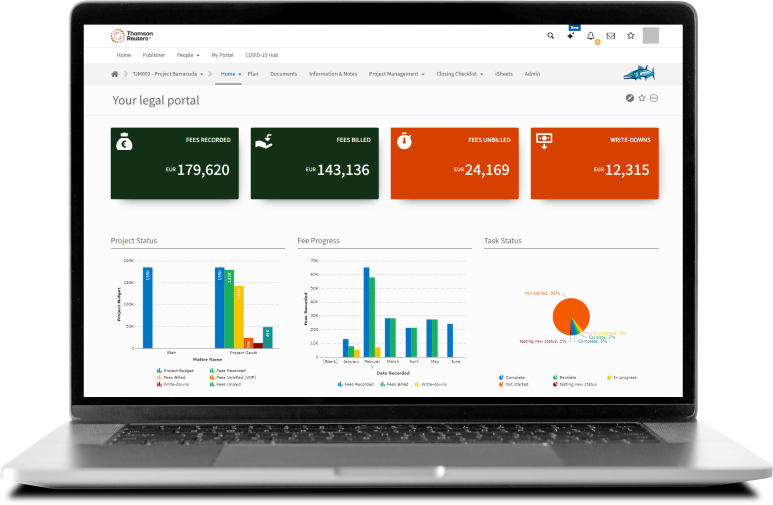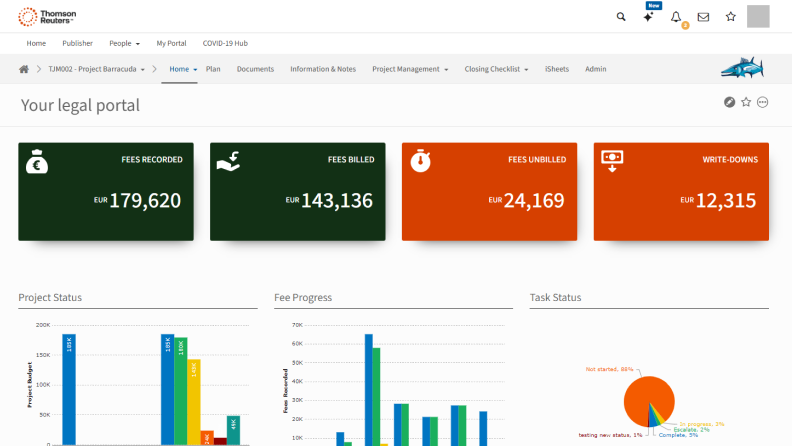HighQ
Effortless collaboration tools for legal professionals
Transform the way you work with a secure, cloud-based solution that streamlines processes, boosts productivity, and enhances service delivery

Enable legal processes and power diverse, scalable, and differentiated solutions

Improve collaboration with a secure, integrated platform
Increase transparency, improve response times, and reduce miscommunication by leveraging HighQ's centralized platform for secure document sharing, collaborative workspaces, and client portals. HighQ makes it easier and safer than ever to collaborate with your colleagues and engage with clients and stakeholders to provide a superior experience.
Explore more features
Have questions?
Contact a representative
Transform legal service delivery with AI-powered collaborative workflows
Meet rising client expectations with HighQ's secure platform that integrates advanced AI capabilities and agentic solutions directly into your legal workflows. Deliver exceptional client experiences with 24/7 access to legal matters, enable real-time document collaboration, and leverage embedded AI for instant insights.
Explore more features
Have questions?
Contact a representative


Reduce time spent on labor-intensive tasks with an automated workflow
Eliminate barriers to service delivery, minimize administrative burden, and reduce overhead costs by using HighQ to easily allocate tasks and share documents and data with complete transparency. Increased visibility and seamless integrations lessen the risk of missing vital information due to manual, time-consuming, and inefficient processes.
Explore more features
Have questions?
Contact a representative
Manage complexity with a streamlined process
Save critical time and empower legal professionals by using HighQ to streamline complex workflows, eliminate redundancy, and develop distinctive services. Embrace technology and automation to increase efficiency today and leverage data-driven strategies for future-proofed processes.
Explore more features
Have questions?
Contact a representative

Built by legal professionals for all legal professionals
Law firms
Achieve peak productivity with automated workflows and documents paired with seamless and secure collaboration tools. Spend less time on manual, repetitive tasks and focus on valuable client work.
Corporate legal departments
Automate routine tasks and workflows, create customized legal intake and self service options, and make data-driven decisions that power growth and align with business priorities.
Government
Manage risk, gain visibility, and optimize your department's work processes with a secure, centralized document repository and a collaboration space with digital intake, self service, and document automation.
The power of HighQ
Discover a new strategic advantage for your legal teams
In today's fast-paced, dynamic legal landscape, HighQ isn't just a tool — it's a distinct advantage, a strategic partner in transforming the way legal professionals operate.
Modern, adaptable, and expandable, HighQ meets the evolving needs of law firms, corporate legal departments, and government organizations. It empowers legal professionals to streamline processes, enhance productivity, and deliver differentiated experiences without sacrificing accuracy or data security.
How legal professionals are using HighQ to solve their problems
"HighQ gives us the ability to scale complex product solutions quickly across our clients and teams, transforming the client experience."
Eric Sham
Legal Tech Solutions Manager
Bird & Bird
"HighQ is so interactive, user-friendly, and intuitive. I use it every day and it makes my life easier."
Tara O'Callaghan
Head of Funds Registration and Listing Service
Dillon Eustace
"Time isn’t wasted sending as many emails, updating calls, or searching for contracts. HighQ makes the legal department more efficient so they can focus on more important work and deliver more value to the company."
Mattia Sommacale
Project Manager
Transformation Office
Questions about HighQ? We're here to support you.
800-950-1215
Call us or submit your email and a sales representative will contact you within one business day.
Contact us
